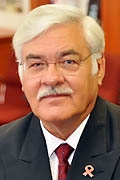Latest News Archive
Please select Category, Year, and then Month to display items
05 June 2018
Photo Supplied
 Archaeological excavations in the Wonderwerk Cave, north of Kuruman in the Northern Cape.
Archaeological excavations in the Wonderwerk Cave, north of Kuruman in the Northern Cape.
Research fellow Dr Lloyd Rossouw from the Department of Plant Sciences at the University of the Free State (UFS) recently published an article in the Nature Ecology and Evolution journal with Dr Michaela Ecker from the University of Toronto as lead author, and Dr James Brink, research fellow at the UFS Centre for Environmental Management. The findings described in “The palaeoecological context of the Oldowan-Acheulean in southern Africa” provides the first extensive paleoenvironmental sequence for the interior of southern Africa by applying a combination of methods for environmental reconstruction at Wonderwerk Cave, which have yielded multiple evidence of early human occupation dating back almost two million years ago.
Where water once was
The Wonderwerk Cave is found north of the Kuruman hills (situated in Northern Cape) a 140m long tube with a low ceiling. The surroundings are harsh. Semi-arid conditions allow for the survival of only hardy bushes, trees, and grasses. But during the Early Pleistocene, stepping out of the Wonderwerk Cave you would have been greeted by a completely different site, the researchers found. Using carbon and oxygen stable isotope analysis on the teeth of herbivores (Dr Ecker), fossil faunal abundance (Dr Brink), as well as the analysis of microscopic plant silica remains (phytoliths) excavated from fossil soils inside the cave (Dr Rossouw), the results show that ancient environments in the central interior of southern Africa were significantly wetter and housed a plant community unlike any other in the modern African savanna.
What difference does it make?
While East African research shows increasing aridity and the spread of summer-rainfall grasslands more than a million years ago, the results from this study indicate an interesting twist. During the same period, shifts in rainfall seasonality allowed for alternating summer and winter-rainfall grass occurrences coupled with prolonged wetlands, that remained major components of Early Pleistocene (more or less the period between one and two million years ago) environments in the central interior of southern Africa. That means our human ancestors were also living and evolving in environments other than the generally accepted open, arid grassland model.
UFS academic joins an elite league of achievers
2010-04-14
 |
| Prof. Dingie van Rensburg |
|
Prof. Dingie van Rensburg, Director of the Centre for Health Systems Research & Development at the University of the Free State (UFS), has joined an elite list of a only few distinguished individuals who have been awarded honorary doctorates by the University of Antwerp (UA) in Belgium.
He is only the third South African to be honoured in this way by the UA, following in the footsteps of Constitutional Court Judge Albie Sachs (2000) and former State President, Nelson Mandela (2004).
He is the first social scientist from South Africa to receive this honorary doctorate from the UA – the highest academic distinction of that university. The university has previously only awarded three honorary doctorates to social scientists: Prof. Raymond Boudon, sociologist at the University of Paris-Sorbonne (1995); Prof. Robert Putman, political scientist at Harvard University (2000); and Prof. John Nash (of A Beautiful Mind fame), mathematician and economist at Massachusetts Institute of Technology (MIT) and Princeton.
The award ceremony will take place on 29 April 2010 in Antwerp.
Prof. Van Rensburg has authored, co-authored and was editor of many books/volumes, chapters in books, monographs, research reports and articles in scientific journals. He has also presented and co-presented at numerous national and international conferences; and supervised a significant number of master’s, doctoral and post-doctoral students.
In his 17 years as director of the Centre he has initiated, managed and led approximately 50 research and development projects, several of them large and long-term projects, and many of an inter-institutional and multidisciplinary nature.
In 2002 he became an NRF-rated researcher and in 2007 his rating as an established researcher was renewed. In the past two decades he received several research grants simultaneously from both the National Research Foundation and the Medical Research Foundation of South Africa, mostly for projects on Tuberculosis, HIV/Aids and antiretroviral treatment.
Prof Van Rensburg holds membership of both the Suid-Afrikaanse Akademie vir Wetenskap en Kuns and the Academy for Science of South Africa; he also served for varying periods on the Councils of both these academies. He was also a member of various health bodies of the Free State Province and the National Science and Technology Forum.
Media Release
Issued by: Mangaliso Radebe
Assistant Director: Media Liaison
Tel: 051 401 2828
Cell: 078 460 3320
E-mail: radebemt@ufs.ac.za
14 April 2010
|